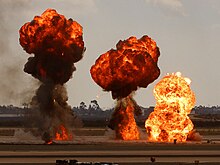
An explosion is a rapid release of energy characterised by the sudden breaking of molecular bonds and the propagation of an explosive wave. Derived from Latin[1]The term "explosion" means "to expel noisily". Explosions involve complex mechanisms where external stimuli increase kinetic energy, triggering chain reactions. The effects are categorised into physiological, thermal and mechanical impacts, affecting human and material body systems. Two primary types of explosions exist: deflagration (wave speed in metres per second) and detonation (wave speed in kilometres per second), distinguished by their wave propagation mechanisms. The Munroe-Newmann Effect demonstrates how geometric configuration can focus shock waves directionally. Factors such as initial kinetic energy and molecular structure influence the explosive process, determining the intensity and characteristics of the energy release.
The references in this article need formatting. (March 2023) |
A explosion is a process characterised by a sudden increase in volume and a large release of energyThe explosion is usually accompanied by high temperatures, the production of gases and a loud bang. An explosion causes pressure waves around the place where it occurs. Explosions are classified according to these waves: in the case of subsonic waves, there is a outbreakin the case of supersonic waves (shock waves), you get a detonation.

The most common artificial explosives are chemical explosives, which decompose through violent oxidisation reactions and produce large quantities of gas and heat.